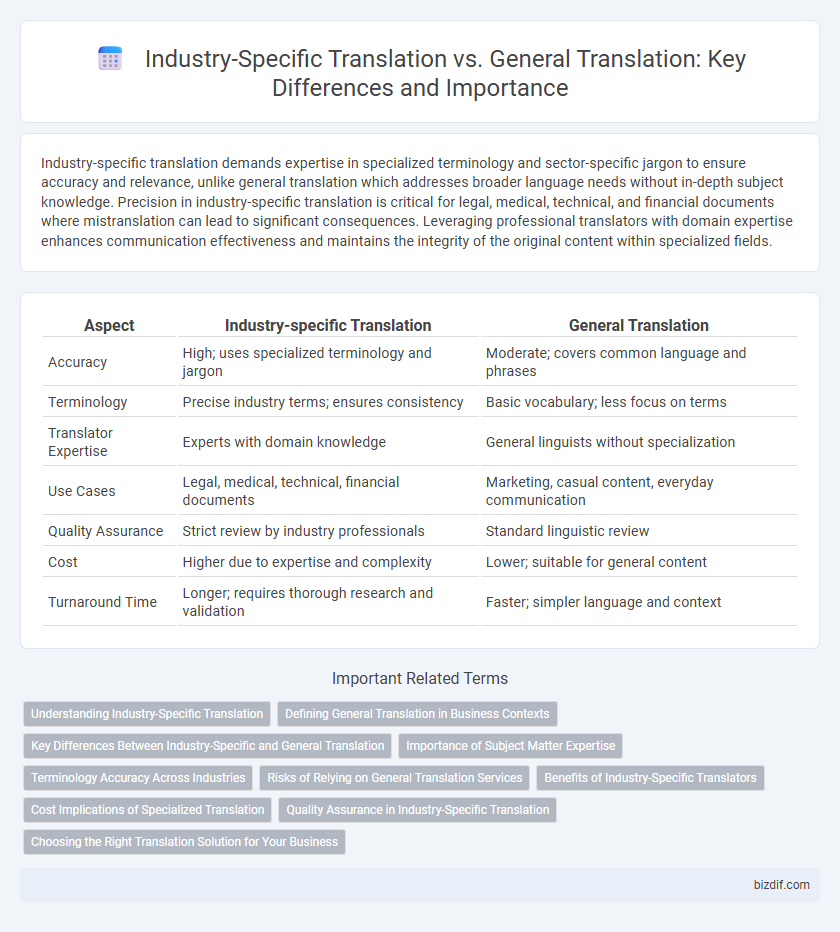Industry-specific translation demands expertise in specialized terminology and sector-specific jargon to ensure accuracy and relevance, unlike general translation which addresses broader language needs without in-depth subject knowledge. Precision in industry-specific translation is critical for legal, medical, technical, and financial documents where mistranslation can lead to significant consequences. Leveraging professional translators with domain expertise enhances communication effectiveness and maintains the integrity of the original content within specialized fields.
Table of Comparison
| Aspect | Industry-specific Translation | General Translation |
|---|---|---|
| Accuracy | High; uses specialized terminology and jargon | Moderate; covers common language and phrases |
| Terminology | Precise industry terms; ensures consistency | Basic vocabulary; less focus on terms |
| Translator Expertise | Experts with domain knowledge | General linguists without specialization |
| Use Cases | Legal, medical, technical, financial documents | Marketing, casual content, everyday communication |
| Quality Assurance | Strict review by industry professionals | Standard linguistic review |
| Cost | Higher due to expertise and complexity | Lower; suitable for general content |
| Turnaround Time | Longer; requires thorough research and validation | Faster; simpler language and context |
Understanding Industry-Specific Translation
Industry-specific translation requires deep knowledge of technical terminology, jargon, and regulatory standards unique to fields such as legal, medical, or engineering sectors. Unlike general translation, it demands precision and subject matter expertise to ensure accurate and contextually appropriate communication. This specialization ensures compliance, clarity, and effectiveness in professional documents and industry communications.
Defining General Translation in Business Contexts
General translation in business contexts involves converting documents, communications, or marketing materials without specialized technical terminology, ensuring clear and accurate language accessible to a broad audience. It focuses on everyday language, commercial terms, and culturally appropriate expressions that support general corporate communication, such as emails, reports, and presentations. This type of translation prioritizes clarity and readability over industry-specific jargon, making it essential for effective cross-cultural business interactions.
Key Differences Between Industry-Specific and General Translation
Industry-specific translation requires deep subject matter expertise to accurately convey technical terminology and industry jargon, ensuring precise communication in fields like legal, medical, or engineering. General translation focuses on everyday language and broader topics, prioritizing fluency and readability over specialized knowledge. The key difference lies in the translator's familiarity with industry-specific concepts, which significantly impacts accuracy and context relevance.
Importance of Subject Matter Expertise
Industry-specific translation demands deep subject matter expertise to ensure accurate terminology and context are preserved, reducing the risk of critical errors. General translation often lacks the precision required for specialized fields such as legal, medical, or technical industries, where nuanced understanding directly impacts outcomes. Employing translators with domain-specific knowledge enhances clarity, compliance, and communication effectiveness in complex professional texts.
Terminology Accuracy Across Industries
Industry-specific translation demands precise terminology accuracy to ensure the correct application of specialized jargon, which general translation often lacks. Fields such as medical, legal, and technical sectors require translators with deep subject matter expertise to maintain the integrity and context of specialized terms. Failure to achieve terminology accuracy can lead to costly misunderstandings, regulatory issues, and loss of credibility within professional industries.
Risks of Relying on General Translation Services
Relying on general translation services for industry-specific content risks inaccuracies due to lack of specialized terminology knowledge, which can lead to miscommunication and costly errors. Industry-specific translation demands expertise in subject matter, such as medical, legal, or technical fields, to ensure precise and culturally appropriate terminology. Failure to use specialized services may result in compliance issues, damaged reputation, and loss of business opportunities.
Benefits of Industry-Specific Translators
Industry-specific translators possess deep knowledge of terminology, jargon, and regulatory requirements unique to sectors like legal, medical, or technical fields, ensuring accurate and contextually appropriate translations. Their expertise minimizes errors that could lead to costly misunderstandings or compliance issues. Businesses benefit from enhanced credibility and effective communication when employing professionals specialized in their industry's language.
Cost Implications of Specialized Translation
Specialized translation in industries such as legal, medical, or technical fields often demands expert translators with subject-matter knowledge, which increases costs compared to general translation services. The precision and accuracy required in industry-specific translation minimize risks of errors that could lead to legal liabilities or financial losses, justifying the higher investment. Conversely, general translation is more cost-effective but may lack the necessary depth, leading to potential misunderstandings in complex sectors.
Quality Assurance in Industry-Specific Translation
Industry-specific translation demands rigorous quality assurance processes to ensure accuracy, consistency, and adherence to specialized terminology critical in fields such as medical, legal, or technical sectors. Employing subject-matter experts and utilizing industry-specific glossaries and translation memory systems enhances translation quality by minimizing errors and maintaining contextual integrity. This targeted approach significantly surpasses general translation quality standards, which often lack the precision required for specialized content.
Choosing the Right Translation Solution for Your Business
Industry-specific translation ensures accuracy by using specialized terminology and context relevant to fields like legal, medical, or technical sectors, enhancing clarity and compliance. General translation offers flexibility for varied content but may lack precision in complex industry jargon, risking misinterpretation. Selecting the right translation solution depends on balancing the need for domain expertise with the volume and scope of content to maintain brand consistency and regulatory adherence.
Industry-specific Translation vs General Translation Infographic

 bizdif.com
bizdif.com